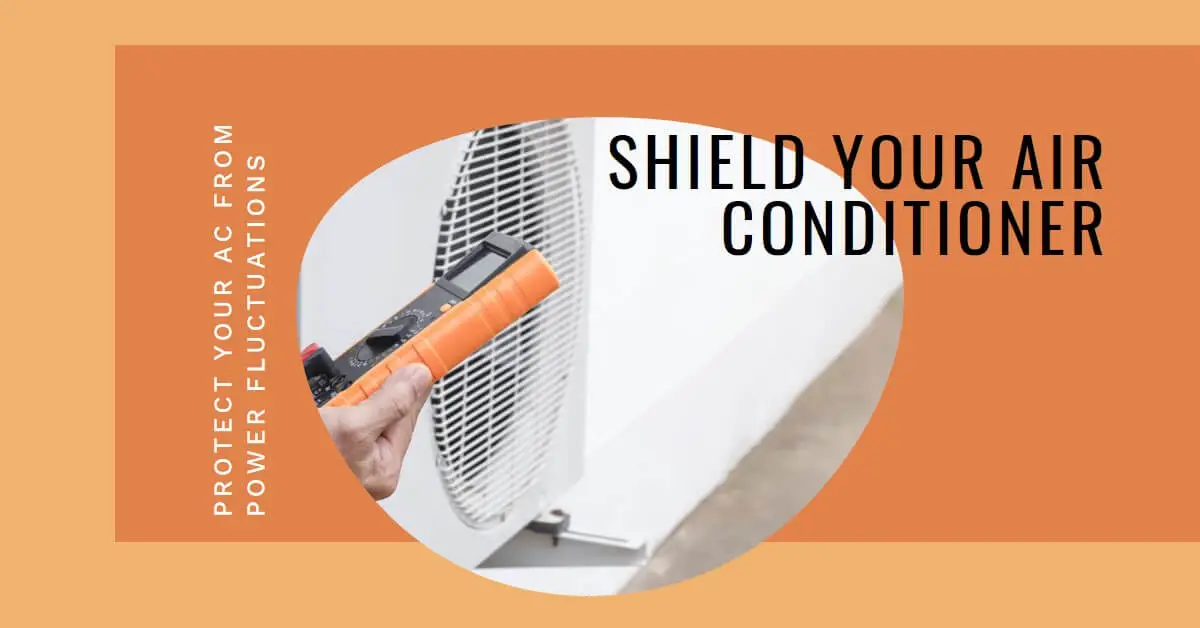Image: “Article Feature Image” by Bing is licensed under [CC BY-NC-SA 4.0]. Source: Bing Graphic Art.
Power fluctuations can pose a significant risk to the performance and lifespan of your air conditioning (AC) unit.
It is essential to take preventive measures to safeguard your AC from the potential damages caused by voltage surges, sags, spikes, and frequency variations.
To protect your air conditioner (AC) Utilize safeguards like surge protection, voltage stabilizers, UPS, upkeep, and power conditioners to greatly minimize harm from voltage issues.
In this article, we will explore effective strategies to protect your AC from power fluctuations, ensuring optimal functioning and longevity of your cooling system.
Understanding Power Fluctuations
Power fluctuations refer to variations in the voltage and frequency of the electrical supply. They can occur due to several reasons, including lightning strikes, utility grid issues, faulty electrical equipment, or heavy machinery usage.
These fluctuations can harm sensitive electrical components within your AC unit and compromise its performance and efficiency.
Risks of Power Fluctuations to AC Units
Power fluctuations can have detrimental effects on AC units if not adequately addressed. Electrical components such as compressors, motors, and circuit boards are susceptible to damage during voltage surges or dips.
Additionally, power fluctuations can reduce the efficiency of your AC, leading to higher energy consumption and increased utility bills.
In severe cases, power fluctuations can even result in complete system failure, requiring costly repairs or replacement.
Read also my article: Voltage Drop: The Hidden Threat To Your Air Conditioner
Steps to Protect AC from Power Fluctuations
Surge Protection:
Installing surge protectors is an effective way to safeguard your AC from sudden voltage spikes.
Surge protectors divert excess voltage away from your AC, preventing damage to its delicate components.
Make sure to choose surge protectors specifically designed for AC units and consider factors such as joule rating, response time, and clamping voltage when selecting a suitable device.
Voltage Stabilizers:
Voltage stabilizers help regulate and maintain a steady voltage supply to your AC, protecting it from voltage sags and surges.
These devices ensure that your AC receives a consistent voltage level, even if the power supply fluctuates.
Different types of voltage stabilizers are available, including servo-controlled and static voltage stabilizers.
Consult an electrician to determine the appropriate stabilizer for your AC unit’s power requirements.
Uninterruptible Power Supply (UPS):
A UPS provides backup power during power outages and offers protection against voltage fluctuations.
It acts as a temporary power source, allowing your AC to continue running smoothly until the main power supply is restored.
UPS systems also provide surge protection and voltage regulation features. Consider the power rating and battery backup time when selecting a UPS for your AC.
Regular Maintenance:
Proper maintenance plays a crucial role in protecting your AC from power fluctuations. Keep electrical connections clean and inspect them regularly for any signs of damage or loose connections.
Ensure your AC unit is properly grounded, as it helps dissipate excess electrical energy. Schedule periodic servicing by qualified professionals to identify and address any potential issues before they escalate.
Power Conditioners:
Power conditioners help eliminate electrical noise and correct voltage irregularities, thereby protecting your AC from power fluctuations.
These devices enhance the quality of the electrical supply, ensuring stable voltage and reducing the risk of damage to your AC unit.
Consult an electrician to determine the most suitable power conditioner for your specific AC requirements.
Additional Tips for Protecting AC Units
Avoiding Power Overload:
Avoid overloading your electrical circuits by limiting the use of high-powered appliances or electronics simultaneously with your AC. Excessive load can increase the chances of voltage fluctuations.
Turning Off During Severe Fluctuations:
During severe power fluctuations or storms, it is advisable to turn off your AC temporarily to avoid potential damage. Resume using your AC once the electrical supply stabilizes.
Monitoring Voltage Levels:
Consider using a voltage monitoring device to keep track of the voltage levels in real-time. This can help identify potential issues and take preventive measures promptly.
Investing in Energy-Efficient AC Units:
Energy-efficient AC units are designed to handle power fluctuations more effectively. They often incorporate built-in protection mechanisms to mitigate the impact of voltage variations. When purchasing a new AC unit, look for models with high energy efficiency ratings and advanced power protection features.
Conclusion
Protecting your AC from power fluctuations is crucial for maintaining its performance, efficiency, and lifespan.
By implementing preventive measures such as surge protection, voltage stabilizers, UPS systems, regular maintenance, and power conditioners, you can significantly reduce the risk of damage caused by voltage surges, sags, spikes, and frequency variations.
Additionally, practicing habits like avoiding power overload, turning off during severe fluctuations, and monitoring voltage levels can further safeguard your AC unit.
Remember that investing in energy-efficient AC units provides an added layer of protection against power fluctuations.
By taking these steps, you can ensure your AC operates smoothly and efficiently, providing you with reliable cooling comfort for years to come.



